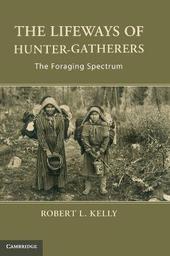
|
The Lifeways of Hunter-Gatherers: The Foraging Spectrum
Hardback
Main Details
| Title |
The Lifeways of Hunter-Gatherers: The Foraging Spectrum
|
| Authors and Contributors |
By (author) Robert L. Kelly
|
| Physical Properties |
| Format:Hardback | | Pages:375 | | Dimensions(mm): Height 260,Width 182 |
|
| Category/Genre | Prehistoric archaeology |
|---|
| ISBN/Barcode |
9781107024878
|
| Classifications | Dewey:306.364 |
|---|
| Audience | | Professional & Vocational | | Tertiary Education (US: College) | |
|---|
| Illustrations |
29 Tables, unspecified; 1 Maps; 19 Halftones, unspecified; 39 Line drawings, unspecified
|
|
Publishing Details |
| Publisher |
Cambridge University Press
|
| Imprint |
Cambridge University Press
|
| Publication Date |
15 April 2013 |
| Publication Country |
United Kingdom
|
Description
In this book, Robert L. Kelly challenges the preconceptions that hunter-gatherers were Paleolithic relics living in a raw state of nature, instead crafting a position that emphasizes their diversity, and downplays attempts to model the original foraging lifeway or to use foragers to depict human nature stripped to its core. Kelly reviews the anthropological literature for variation among living foragers in terms of diet, mobility, sharing, land tenure, technology, exchange, male-female relations, division of labor, marriage, descent and political organization. Using the paradigm of human behavioral ecology, he analyzes the diversity in these areas and seeks to explain rather than explain away variability, and argues for an approach to prehistory that uses archaeological data to test theory rather than one that uses ethnographic analogy to reconstruct the past.
Author Biography
Robert L. Kelly is Professor of Anthropology at the University of Wyoming. He has served as department head and as director of the Frison Institute. He is a past president of the Society for American Archaeology and a past secretary of the Archaeology Division of the American Anthropological Association. He has authored more than one hundred articles, books and reviews, including two of the most widely used archaeology college textbooks. He is internationally recognized as an expert in the ethnology and archaeology of hunting and gathering peoples. In the past forty years, he has worked on research projects throughout the western United States and Madagascar, and has lectured in Europe, Asia and South America. He is currently researching caves and high altitude adaptations in Wyoming, and the archaeology of ice patches in Glacier National Park, Montana.
Reviews'Using Latin America as a case study, Kaplan clearly explains the interplay between economics and politics in the international arena ... A thoroughly analytical work with the potential to transform thinking about globalization and austerity measures worldwide. Summing up: highly recommended. Upper-division undergraduate, graduate, research, and professional collections.' L. O. Imade, Choice
|